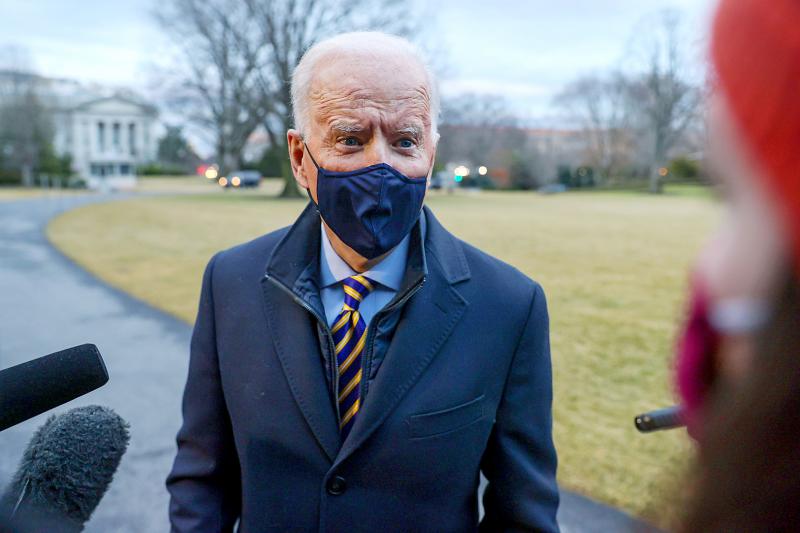US President Joe Biden intends to “recalibrate” the US’ relationship with Saudi Arabia and would emphasize outreach to Saudi Arabian King Salman, a move that signals a downgrade in ties with Saudi Arabian Crown Prince Mohammad Bin Salman, the nation’s de facto ruler.
In Biden’s first few days in office, the US put a hold on some key weapons sales to the kingdom and announced new efforts to bring an end to the Saudi Arabian-led war in Yemen.
Biden has also called on Riyadh to improve its human rights record.

Photo: Reuters
“We’re going to recalibrate our relationship with Saudi Arabia,” White House press secretary Jen Psaki told reporters on Tuesday.
“Part of that is going back to engagement counterpart-to-counterpart. The president’s counterpart is King Salman,” she said.
Instead of engaging primarily with Biden, the crown prince’s most appropriate counterpart is US Secretary of Defense Lloyd Austin, a person familiar with the matter said.
While Prince Mohammad’s official role is deputy prime minister and defense minister, he has a vast range of responsibilities as heir to the throne his father has held since 2015.
The changes suggest that relations would return to “more structured, routine channels,” said Aaron Miller, a senior fellow at the Carnegie Endowment for International Peace and a former Middle East official at the US Department of State.
“This is a slapdown of MBS, who the administration views as reckless and ruthless,” Miller said, referring to Prince Mohammad.
Separately, Biden said that China would pay a price for its human rights abuses.
Responding to queries at a televised event on Beijing’s handling of Muslim minorities in Xinjiang, Biden said that “there will be repercussions for China and [Chinese President Xi Jinping, 習近平] knows that.”
Xi has drawn global criticism for holding Uighurs in internment camps and other human rights abuses.
The US would reassert its global role in speaking up for human rights, Biden said, adding that he would work with the international community to get China to protect them.
“China is trying very hard to become a world leader and to get that moniker and be able to do that they have to gain the confidence of other countries,” he said.
“As long as they are engaged in activity that is contrary to basic human rights, it is going to be hard for them to do that,” he said.
Additional reporting by Reuters

A Chinese aircraft carrier group entered Japan’s economic waters over the weekend, before exiting to conduct drills involving fighter jets, the Japanese Ministry of Defense said yesterday. The Liaoning aircraft carrier, two missile destroyers and one fast combat supply ship sailed about 300km southwest of Japan’s easternmost island of Minamitori on Saturday, a ministry statement said. It was the first time a Chinese aircraft carrier had entered that part of Japan’s exclusive economic zone (EEZ), a ministry spokesman said. “We think the Chinese military is trying to improve its operational capability and ability to conduct operations in distant areas,” the spokesman said. China’s growing

Nine retired generals from Taiwan, Japan and the US have been invited to participate in a tabletop exercise hosted by the Taipei School of Economics and Political Science Foundation tomorrow and Wednesday that simulates a potential Chinese invasion of Taiwan in 2030, the foundation said yesterday. The five retired Taiwanese generals would include retired admiral Lee Hsi-min (李喜明), joined by retired US Navy admiral Michael Mullen and former chief of staff of the Japan Self-Defense Forces general Shigeru Iwasaki, it said. The simulation aims to offer strategic insights into regional security and peace in the Taiwan Strait, it added. Foundation chair Huang Huang-hsiung

PUBLIC WARNING: The two students had been tricked into going to Hong Kong for a ‘high-paying’ job, which sent them to a scam center in Cambodia Police warned the public not to trust job advertisements touting high pay abroad following the return of two college students over the weekend who had been trafficked and forced to work at a cyberscam center in Cambodia. The two victims, surnamed Lee (李), 18, and Lin (林), 19, were interviewed by police after landing in Taiwan on Saturday. Taichung’s Chingshui Police Precinct said in a statement yesterday that the two students are good friends, and Lin had suspended her studies after seeing the ad promising good pay to work in Hong Kong. Lee’s grandfather on Thursday reported to police that Lee had sent

A Chinese ship ran aground in stormy weather in shallow waters off a Philippines-controlled island in the disputed South China Sea, prompting Filipino forces to go on alert, Philippine military officials said yesterday. When Philippine forces assessed that the Chinese fishing vessel appeared to have run aground in the shallows east of Thitu Island (Jhongye Island, 中業島) on Saturday due to bad weather, Philippine military and coast guard personnel deployed to provide help, but later saw that the ship had been extricated, Philippine navy regional spokesperson Ellaine Rose Collado said. No other details were immediately available, including if there were injuries among